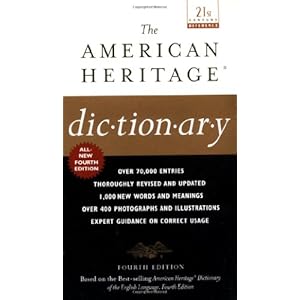
Are you looking to buy The American Heritage Dictionary: Fourth Edition (21st Century Reference)? here is the right place to find the great deals. we can offer discounts of up to 90% on The American Heritage Dictionary: Fourth Edition (21st Century Reference). check out the link below:
>> Click Here to See Compare Prices and Get the Cheapest Deals
The American Heritage Dictionary: Fourth Edition (21st Century Reference) Review
The American Heritage Dictionary is an excellent 1 volume dictionary, complete with the newest words, beautiful colorful design, and over 2,000 pages on all facets of the English language. I will compare this dictionary to the New Oxford American Dictionary (NOAD) as these are the two best 1-volume English dictionaries available.In my opinion, the NOAD is clearly a better dictionary for reasons listed below. Generally, the NOAD's entries are longer and more detailed, hence the reader gets more information. The American Heritage definitions are almost too concise (usually too concise for my preference) although many people may prefer the shorter definitions. Each dictionary will have a number of lesser know words (and even some more common words) the other dictionary will not have (especially scientific words, geographical locations, and newer words), so one dictionary is not superior as far as having a significant amount of more entries. It appears to me the NOAD has more entries, but even if it doesn't, it is still a better dictionary.
Some comparisons of American Heritage Dictionary (2006) to the NOAD (New Oxford American Dictionary)(2004)
-The American Heritage 2,006 pages long A to Z, the NOAD is 1,959 pages A to Z. The American Heritage does not list anywhere that I can see how many entries it has. The NOAD says it has over 250,000 entries. The font of the American Heritage is smaller but it is just as easy to read as the NOAD's font. The NOAD uses 3 columns per page, the American Heritage uses 2.
-The American Heritage has some newer words not found in NOAD, such as Red state, Blue state, Sudoku, Texas hold'em, but don't get the idea though this makes it better than the NOAD. Here are some words (some relatively recent) the NOAD has that the American Heritage does not have: macarana (the dance), tamagotchi (the Japanese toy), October Surprise, Hamas (the militant Palestinian group), heat-seeking, (as a missile) tarte Tatin, solid south, spaceship earth.
-The American Heritage is visually more appealing with its 4.000 color pictures complete with a nice design layout. Although the NOAD lacks color, it has many effective illustrations, and it even devotes full pages to maps.
-A big advantage of the American Heritage is that it details some interesting etymological histories of about 400 common words. For instance the American Heritage dictionary gives a 13-line history on the word Kangaroo, explaining that it is not from an Aborigine meaning "I do not know," and then proceeds to explain the true history of the word. The American Heritage also has usage notes on over 750 synonyms, 100 notes on regionalisms, 500 notes on usage issues, and 50 notes on the social dimensions of some words.
-Although the NOAD does not give these selected, interesting word histories, overall the NOAD etymology is done much better than the American Heritage's etymology. The NOAD's etymological explanations are consistently more detailed, and it will frequently add a time frame when the word came into use, e.g. early 17th century (although it will not give specific years), something the American Heritage does not. The NOAD will give folk etymology of some words, and like the American Heritage will give notes on proper usage and help the reader/writer use the right word with synonyms.
-One huge advantage the NOAD has over the American Heritage is that it adds many, many more common word phrase origins associated with a word, including proverbs, clichés, etc. For instance the word `pie" n. the NOAD will list the phrases "as easy as pie" "as sweet as pie" "a slice of the pie" and "pie in the sky" (and giving definitions of each phrase) while the American Heritage just lists and defines "pie in the sky." The NOAD will also give the origin of a few phrases such as "flash in the pan" (from the failure of gunpowder to ignite properly to fire a gun). The American Heritage does none of this with its phrases, but note that the American Heritage Dictionary publishes a separate book on word phrase origins, which is probably the reason it places little emphasis on them in its main dictionary.
-The NOAD is superior in the biographical entries to the American Heritage. Each dictionary will have some people the other will not, but when they are similar, the NOAD almost always gives more information in a biographical entry. The NOAD is also superior in geographical entries. food entries, and political terms. The NOAD is also better at including entries one would normally find in an encyclopedia, for instance Tamil Tigers, Hammond Organ, Abby Road are in the NOAD, but not in the American Heritage.
-The NOAD is slightly better in giving information about nations of the world. The American Heritage's entries on nations is short and very basic, while the NOAD's, though not much longer, it will nevertheless give a better history of a country than the American Heritage will.
I love dictionaries, and in comparing these two dictionaries, the NOAD to me has its pulse on the English language more than the American Heritage. The American Heritage Dictionary however is still very good choice, but if I could take only one, it would be the NOAD. If you love words, you should get both to enjoy the variety each provides.
The American Heritage Dictionary: Fourth Edition (21st Century Reference) Overview
Want to learn more information about The American Heritage Dictionary: Fourth Edition (21st Century Reference)?
>> Click Here to See All Customer Reviews & Ratings Now
0 comments:
Post a Comment